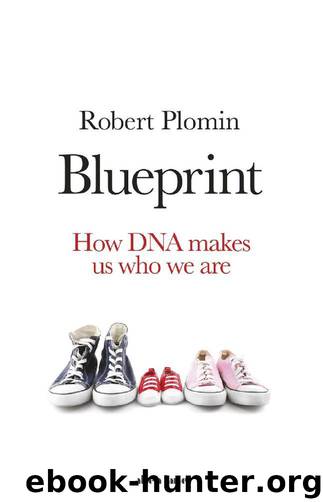Blueprint: How DNA Makes Us Who We Are by Robert Plomin

Author:Robert Plomin
Language: eng
Format: mobi, epub
ISBN: 9780241282083
Publisher: Penguin Books Ltd
Published: 2018-10-03T22:00:00+00:00
12
The DNA fortune teller
It has been known for decades that the heritability of psychological disorders and dimensions is caused by many DNA differences, not just one or two genes that pack a big punch. The shock from genome-wide association studies was the realization what ‘many’ meant – not a few dozen DNA differences but tens of thousands. GWA studies have shown that there are no associations that account for more than 1 per cent of the differences between individuals and that the average effect size is less than 0.01 per cent. This means that thousands of DNA differences contribute to the heritability of psychological traits and that huge GWA sample sizes are needed to detect these tiny associations.
After the false start of candidate-gene studies that failed to replicate, GWA research set a stringent criterion for reporting statistically significant ‘hits’ by correcting associations for a million tests across the genome. This criterion missed the many associations that do not, and cannot, reach statistical significance because their effects are so small. No matter how tiny these effects are, they can be combined to create a composite score, or polygenic score. Although the minuscule effects of individual SNPs are useless for prediction, polygenic scores that aggregate these effects, no matter how small, can powerfully predict genetic propensities. The ‘poly’ of ‘polygenic’ is what makes these scores able to predict individual differences in psychology. In other words, the key criterion for a GWA study is not how many associations reach statistical significance. Much more important is the power of a polygenic score derived from the results of a GWA study to predict individual differences.
Polygenic scores, based on DNA rather than crystal balls, are fortune tellers. As we shall see, prediction is crucial because it is the key to the prevention of psychological problems and the promotion of promise. This is the new world of personal genomics, which begins with the ability to use inherited DNA differences across the genome to predict psychological differences. For psychological dimensions and disorders, some polygenic scores have already reached impressive levels of predictive power. This chapter shows what a polygenic score is and describes the power of polygenic scores created in the past two years. It reveals some of my own polygenic scores to glimpse the future of psychological personal genomics.
Because polygenic scores are the basis for the DNA revolution in psychology, it is essential to understand what they are. A polygenic score is like any composite score that psychologists routinely use to create scales from items, such as those on a personality questionnaire. The goal of a polygenic score is to provide a single genetic index to predict a trait, whether schizophrenia, well-being or intelligence. To get a concrete understanding of a polygenic score, consider a personality trait like shyness. A questionnaire to assess shyness includes multiple items in order to tap into different facets of shyness. For example, a typical shyness questionnaire will have items about how anxious you are in social situations and how much you
Download
Blueprint: How DNA Makes Us Who We Are by Robert Plomin.epub
This site does not store any files on its server. We only index and link to content provided by other sites. Please contact the content providers to delete copyright contents if any and email us, we'll remove relevant links or contents immediately.
Sapiens: A Brief History of Humankind by Yuval Noah Harari(14389)
Sapiens by Yuval Noah Harari(5370)
Pale Blue Dot by Carl Sagan(5007)
Homo Deus: A Brief History of Tomorrow by Yuval Noah Harari(4918)
Livewired by David Eagleman(3772)
Origin Story: A Big History of Everything by David Christian(3692)
Brief Answers to the Big Questions by Stephen Hawking(3435)
Inferior by Angela Saini(3314)
Origin Story by David Christian(3201)
Signature in the Cell: DNA and the Evidence for Intelligent Design by Stephen C. Meyer(3138)
The Gene: An Intimate History by Siddhartha Mukherjee(3098)
The Evolution of Beauty by Richard O. Prum(2997)
Aliens by Jim Al-Khalili(2829)
How The Mind Works by Steven Pinker(2816)
A Short History of Nearly Everything by Bryson Bill(2698)
Sex at Dawn: The Prehistoric Origins of Modern Sexuality by Ryan Christopher(2529)
From Bacteria to Bach and Back by Daniel C. Dennett(2484)
Endless Forms Most Beautiful by Sean B. Carroll(2482)
Who We Are and How We Got Here by David Reich(2437)
